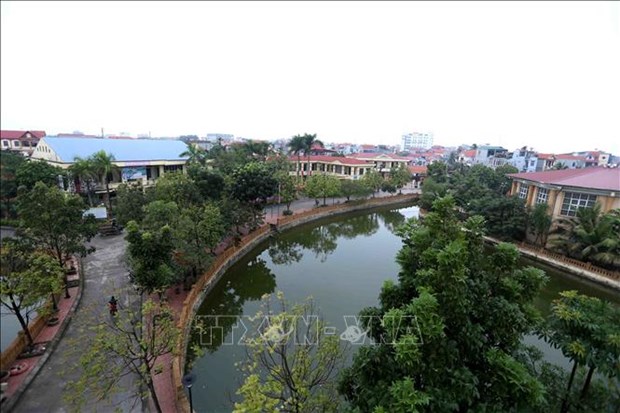Hanoi spends over 2.4 billion USD on rural growth in five years
Hanoi spent over 56.5 trillion VND (2.4 billion USD) on the development of agriculture, new-style rural areas, and farmers’ living standards between January 2016 and June 2020.
 A rural road in Hanoi's Dan Phuong district (Photo: VNA)
A rural road in Hanoi's Dan Phuong district (Photo: VNA)Hanoi (VNA) – Hanoi spent over 56.5 trillion VND (2.4 billion USD) on the development of agriculture, new-style rural areas, and farmers’ living standards between January 2016 and June 2020.
The information was reported at a working session on August 6 between a delegation led by Deputy Minister of Agriculture and Rural Development Tran Thanh Nam and the steering board for the Hanoi Party Committee’s Programme 2 on rural development for 2016-2020.
At the function, Chu Phu My, director of the municipal Department of Agriculture and Rural Development, said in spite of African swine fever and COVID-19, the city’s agro-forestry-fishery in the first half of 2020 grew 1.61 percent year-on-year.
According to him, Hanoi has so far carried out land allocation on 79,454 hectares. It is home to 164 high-tech farming models and 141 agricultural production connection models. As a result, local farmers are following more sustainable practices to turn out branded products and forming links with enterprises to ensure a stable distribution market.
Meanwhile, the city has six districts recognised as new-style rural areas, namely Dan Phuong, Dong Anh, Thanh Tri, Hoai Duc, Quoc Oai, and Gia Lam.
To date, local authorities recognised 355 out of its 382 communes (92.9 percent) as new-style rural areas, and 13 as advanced ones. Of the remainder, 24 communes have fulfilled between 15 and 18 of the criteria.
In 2020, Hanoi aims to have Son Tay town and six more districts meeting the criteria, while selecting Dan Phuong and Hong Van communes to propel toward becoming model new-style rural areas.
The national target programme on building new-styled rural areas was initiated by the Government in 2010 with the aim of developing rural regions. The list of criteria includes the development of infrastructure, the improvement of production capacity, environmental protection, and the promotion of cultural values.
At the meeting, Nam lauded such achievements, stressing that the goal of the national target programme is to improving people’s living standards.
He noted income gap remains between the city’s urban and rural districts, adding that measures to increase local income is important to Hanoi.
Apart from new-style countryside building, Hanoi has also been promoting the “One Commune – One Product” (OCOP) programme.
Hanoi recently announced 275 products meeting standards of the OCOP programme at the municipal level in 2019, raising the total number of such products here to 301.
According to the local coordinating office for new-style countryside building, the capital city classified 301 products last year, including six rated five stars, 207 others four stars, and 88 three stars. It also stepped up promoting OCOP products, thus helping to improve consumers’ recognition of and trust in local goods.
During the first half of 2020, it continued to enhance communication about the OCOP programme and issued temporary guidance on the management and use of OCOP marks and star ratings on labels and packages of products with at least three stars in the programme.
Meanwhile, local districts and towns have also selected products for classification at the district level.
Hanoi aims to rate about 800 – 1,000 OCOP products by the end of this year.
Last year, Hanoi announced it would spend 265 billion VND on implementing the local OCOP programme for the 2019 – 2020 period.
According to the plan, 100 percent of OCOP programme managers at commune-, district, and municipal level public agencies as well as at organisations, businesses and cooperatives registering for the programme will have to undergo training to improve their building capacity.
The capital city has set a goal of developing at least two eco-craft village models. It will look to improve the local origin tracing system for agro-forestry-fishery goods (https://hn.check.net.vn) and website serving State management and demand-supply connectivity related to Hanoi's OCOP products (http://nongthonmoihanoi.gov.vn/)./.













